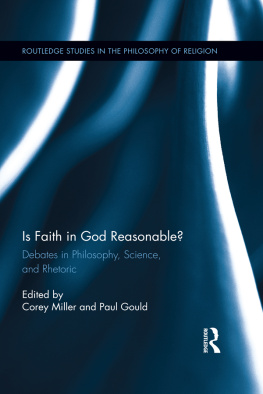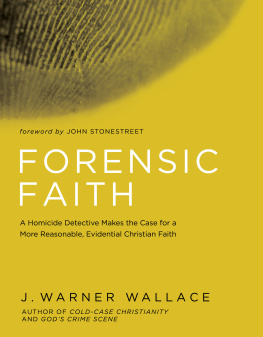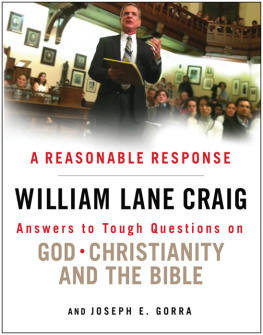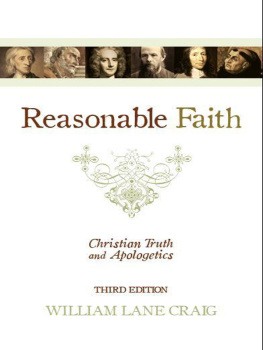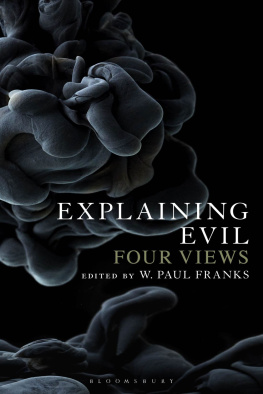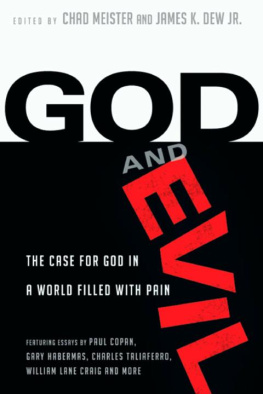1
Introduction
Corey Miller and Paul Gould
In our Western academic philosophy, religious belief is commonly regarded as unreasonable and is viewed with condescension or even contempt.
Norman Malcolm
Rhetoric to the contrary, God is no longer dead in the Western academy. In 1966 Time magazine put forth an issue with a notoriously pitch-black cover with three bright red words bellowing the question, Is God Dead? But in 1967 a new generation made its debut with Alvin Plantingas God and Other Minds: A Study of the Rational Justification of Belief in God . Belief in God was respectable again. Following in Plantingas wake was a resurgence of Christian philosophers flooding the subfield of philosophy of religion in academia with a firestorm of fresh publications.
The question about the reasonableness of faith in God is as intellectually, morally, and existentially important now as it ever has been in history. It is an extremely hot topic in todays academy. Christian academic and professional societies flourish in every discipline of the university. To cite but one example, consider the discipline of philosophy. Within the American Philosophical Association two of the largest subgroups are the Philosophy of Religion Group and the Society of Christian Philosophers. Publications have blossomed with a number of journals in play including Faith and Philosophy, The International Journal for Philosophy of Religion, Religious Studies, Sophia , and Philosophia Christi . Indeed, one of the largest graduate schools in philosophy on the North American continent (Biola University, Talbot School of Theology) is built solely upon a masters degree in philosophy of religion.
The God debate is also a hot topic in todays popular world. The scholarly debate has spilled over into the highways and byways of our everyday lives through popular websites, blogs, media outlets, and publishing houses. Best-selling books by believers (e.g., Tim Kellers The Reason for God ) and unbelievers (e.g., Richard Dawkinss The God Delusion ) sit atop The New York Times best seller lists for months (as we write this, Reza Aslans Zealot , a revisionist tome about the historical Jesus is number one on the list). In addition, documentaries with titles such as Religulous, The Unbelievers, Expelled , and Jesus Camp keep the issue before a non-reading public that shows no sign of listeners fatigue.
This immense interest is also evidenced most recently by the widespread public discussion of the connection between militant religious belief and terrorism since 2001, noting that there is perhaps no greater motivation to action than religious motivation by the faithful. This makes the question concerning the reasonableness of faith in God no mere academic matter. The relevance of the God question is also demonstrated in the culture wars in America with regard to the public square, namely, the question of the relationship of church and state in matters of public policy. The secularist wants to preclude religious belief from entering the public square on account of its lack of rationality and its commitment to blind or parochial faith; the believer, in a desire to maintain personal integrity, seeks to carve out a role for religious belief in the public square.
In light of this renewed and vigorous interest, as well as the rise of militant religion and terrorism and the emergent reaction by neo-atheism, the God debate is vibrant and alive today. In the academy, this development has been accompanied by a plethora of monographs, recent introductory texts, and general anthologies addressing a variety of issues such as the existence and nature of God, religious diversity, the problem of evil, religious experience, the problem of divine hiding, the relationship between God and ethics, the relationship of science and religion, and the rationality of religious belief. Most of these topics have recent, specialized anthologies.
In the last decade or so the problem of evil has been the subject of several recent anthologies, notably, William Rowes God and the Problem of Evil (Blackwell, 2001). Paul Moser and Dan Howard-Snyder have published a slew of recent essays on the problem of Divine Hiddenness (Cambridge, 2002). Paul Copan and Paul Moser have published a collection of essays extending attention to arguments for and against Gods existence in The Rationality of Theism (Routledge, 2003). Michael Martin has put together a fine anthology trumpeting atheism, The Cambridge Companion to Atheism (Cambridge, 2007). In partial response we have by William Lane Craig and J. P. Moreland the most up-to-date anthology on natural theology, The Blackwell Companion to Natural Theology (Blackwell, 2009). On religious diversity, we find Chad Meisters excellent text, The Oxford Handbook of Religious Diversity (Oxford, 2011). On philosophy of religion proper we have the work by Louis Pojman and Michael Rea, Philosophy of Religion: An Anthology (Cengage Learning, 2011). And noteworthy essays on science and Christianity are included in the work by J. B. Stump and Alan Padget, The Blackwell Companion to Science and Christianity (Wiley-Blackwell, 2012).
Absent from this list of recent anthologies, however, is a fresh, up-to-date text centering exclusively on whether faith in God is reasonable as considered from the contemporary vantage points of science, philosophy, and rhetoric. Indeed, there is virtually no major work of this sort, especially not concerning a live debate examined under the rhetorical rubric. A signpost work on the rhetoric of religion was put forth in 1961 by Kenneth Burke, The Rhetoric of Religion (University of California Press, 1961). Although there are journals that segue some of the fields mentioned ( Philosophy and Rhetoric, Journal of Communication and Religion , etc.) and works exist on the relationship of rhetoric and biblical studies, politics, religious literature, pulpit rhetoric, and so on, we arent aware of any recent text examining a public debate by two highly published philosophers of religion or science and further analyzed under the lenses of recent philosophy, science, and rhetoric.
This project will consider this important question of the reasonableness about faith in God in light of, and by those working in the fields of, contemporary science, philosophy, and in a more novel fashion, rhetoric, or the art of persuasion and use of particular evidence or reasons. Hence, in debating the question of whether faith in God is reasonable through such lenses, it will give the reader a broader and more credible scope for answering the question and considering the resultant implications of such an answer for him- or herself.
The God Debate: Craig vs. Rosenberg
This book centers on a formal public debate that took place at Purdue University in West Lafayette, Indiana, on February 1, 2013 over the question, Is faith in God reasonable? With over 14,000 live or live-stream viewers from over 60 countries and with over 100,000 hits on YouTube by this volumes publication, the debate between William Lane Craig and Alex Rosenberg ranks as one of the most highly watched debates of the decade. The atmosphere that night was charged with anticipation: two leading defenders of Christianity and atheism were going to present their case, standing toe-to-toe with each other to debate the rationality of belief in God. And debate they did. The interchange was lively, relevant, heated at times, and informative. We have included the full debate transcript in Part One of this book.
The motivation for this book, however, began when a search for debate opponents on the topic revealed an aggressive interest on atheistic blog sites about the nature and effectiveness of atheists debating with Christian philosopher William Lane Craig. Surprisingly, we discovered that many bloggers on these sites, a few of whom are well-known atheists (academic and non-academic) seek to discourage such debates (indeed, attempts were made to dissuade Dr. Alex Rosenberg from debating weeks before the actual event). The basis for such discouragement is the claim that Dr. Craig, while a noted philosopher in his own right, wins debates proffering his Christian deity not on the basis of rational content but, charitably, on the basis of his

